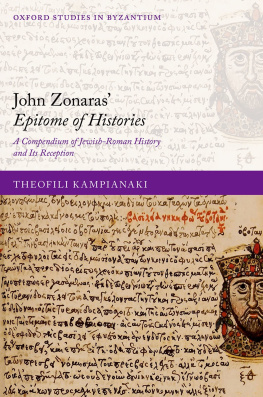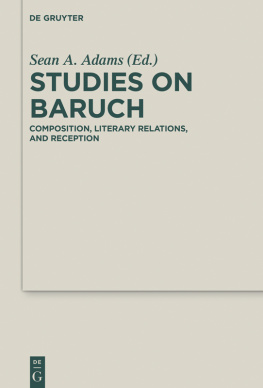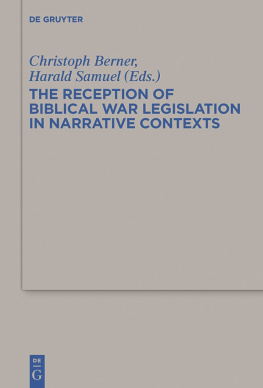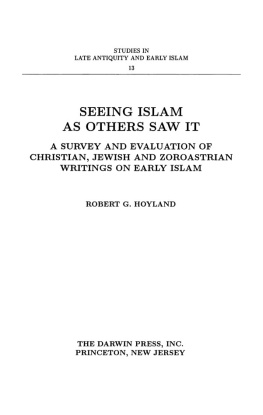Oxford Studies in Byzantium
Oxford Studies in Byzantium consists of scholarly monographs and editions on the history, literature, thought, and material culture of the Byzantine world.
Symeon Stylites the Younger and Late Antique Antioch
From Hagiography to History
Lucy Parker
Depicting Orthodoxy in the Russian Middle Ages
The Novgorod Icon of Sophia, the Divine Wisdom
gnes Kriza
The Beginnings of the Ottoman Empire
Clive Foss
Church Architecture of Late Antique Northern Mesopotamia
Elif Keser Kayaalp
Byzantine Religious Law in Medieval Italy
James Morton
Caliphs and Merchants
Cities and Economies of Power in the Near East (700950)
Fanny Bessard
Social Change in Town and Country in Eleventh-Century Byzantium
Edited by James Howard-Johnston
Innovation in Byzantine Medicine
The Writings of John Zacharias Aktouarios (c.1275c.1330)
Petros Bouras-Vallianatos
Emperors and Usurpers in the Later Roman Empire
Civil War, Panegyric, and the Construction of Legitimacy
Adrastos Omissi
The Universal History of Stepanos Tarneci
Introduction, Translation, and Commentary
Tim Greenwood
The Letters of Psellos
Cultural Networks and Historical Realities
Edited by Michael Jeffreys and Marc D. Lauxtermann

Great Clarendon Street, Oxford, OX2 6DP, United Kingdom
Oxford University Press is a department of the University of Oxford. It furthers the Universitys objective of excellence in research, scholarship, and education by publishing worldwide. Oxford is a registered trade mark of Oxford University Press in the UK and in certain other countries
Theofili Kampianaki 2022
The moral rights of the author have been asserted
First Edition published in 2022
Impression: 1
All rights reserved. No part of this publication may be reproduced, stored in a retrieval system, or transmitted, in any form or by any means, without the prior permission in writing of Oxford University Press, or as expressly permitted by law, by licence or under terms agreed with the appropriate reprographics rights organization. Enquiries concerning reproduction outside the scope of the above should be sent to the Rights Department, Oxford University Press, at the address above
You must not circulate this work in any other form and you must impose this same condition on any acquirer
Published in the United States of America by Oxford University Press
198 Madison Avenue, New York, NY 10016, United States of America
British Library Cataloguing in Publication Data
Data available
Library of Congress Control Number: 2022931387
ISBN 9780192865106
ebook ISBN 9780192688583
DOI: 10.1093/oso/9780192865106.001.0001
Printed and bound by CPI Group (UK) Ltd, Croydon, CR0 4YY
Links to third party websites are provided by Oxford in good faith and for information only. Oxford disclaims any responsibility for the materials contained in any third party website referenced in this work.
To my parents, Kyriakos and Evangelia
Preface and Acknowledgements
This book derives from the thesis I submitted to the Faculty of Medieval and Modern Languages, University of Oxford, in Spring 2017. The completion of my thesis and subsequently this book would not have been possible without the support and assistance of a number of people, to whom I am grateful.
I am indebted, first and foremost, to Professor Marc Lauxtermann, my supervisor and academic mentor in Oxford, for his valuable comments and suggestions, and for his sharing of expertise with me, but also for his kind advice and patience. Special thanks are also due to Dr Ruth Macrides and Dr Ida Toth, the examiners in my viva voce examination, for their detailed feedback and comments as to how I could expand my thesis and turn it into a book. I am also grateful to Dr Catherine Holmes for her valuable feedback in the early stages of my research, and to Dr Georgi Parpulov and Dr Dimitrios Skrekas for devoting much of their time to helping me read and transcribe comments and epigrams inscribed in manuscripts of Zonaras chronicle.
I would like to express my sincere gratitude to the Alexander S. Onassis Foundation and the A. G. Leventis Foundation, as without their generous support I would not have been able to pursue my doctoral studies in Oxford and consequently produce this book. I also owe thanks to: Wolfson College, for offering me three travel grants to present preliminary findings of my research at international conferences; the Wolfson Ancient World Research Cluster, for providing me with a grant to digitize a number of manuscripts for the requirements of my research; and the Zernov-Carras Scholarship Fund, for offering me two research grants.
The completion of this book was made possible with the award of a two-year Research Fellowship at the Birmingham Research Institute for History and Cultures (BRIHC) and the Centre for Byzantine, Ottoman, and Modern Greek Studies, University of Birmingham, where the intellectual climate was stimulating, creative, and conducive to undertaking this research. I am particularly grateful to Professor Leslie Brubaker, Dr Elena Theodorakopoulos, Dr Daniel Reynolds, and Dr Klaus Richter for being so supportive of a young colleague and, crucially, a new mum.
I would also like to thank Professor Elizabeth Jeffreys for her guidance in the publication of this book and the anonymous reviewers of the Oxford Studies in Byzantium series for their detailed feedback. I also owe thanks to: Professor Athanasios Markopoulos both for his assistance in the final stages of producing this book and for his encouragement over the many years we have known each other; and my dear friend Dr Angeliki-Nektaria Roumpou for helping me access many resources during the Covid pandemic.
Contents
As there is no standard form for the transliteration of Greek names, place names, and terms in general, I have used the versions of these words that appear in the Oxford Dictionary of Byzantium.
Abbreviations of journals and databases are listed in full at the beginning of the book. Publications cited in abbreviated form are cited in full in the Bibliography at the end. Primary texts in prose are cited by page number and, if necessary, line. Primary texts in verse are cited by verse.
Quotations in Greek which exceed three lines/verses are indented. Shorter quotations in Greek run on in the text. All translations from Medieval Greek into English are my own, unless otherwise indicated in the footnotes.
Acta Sanctorum, 71 vols (Paris, 18631940)
Bibliotheca hagiographica graeca3, ed. by F. Halkin, 3 vols in 1 pt (Brussels, 1957)
Byzantine and Modern Greek Studies
Byzantion
Byzantina Symmeikta
Byzantinische Zeitschrift
Database of Byzantine Book Epigrams
Dumbarton Oaks Papers
Greek, Roman, and Byzantine Studies









